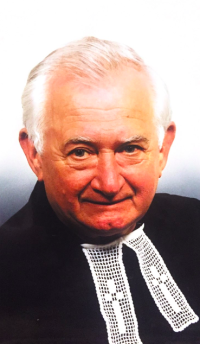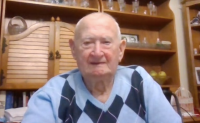"And then after the uprising I had some problems, because I was so problematic. And we had… by the district chief of the Hlinka people's party, he lived in our village, and I knew it was approaching something. There was confabulation. Once, so early in the morning, and I went to the mushrooms. And when I went, the day before I drew such a prospectus and wrote, "Guardsmen, your time is up. They're already building a gallows for you, everyone will be killed there. “ And I drew how they burned. I thought it would be nice, I went down from the mushrooms and the whole village Turická was on feet, and I said that what it is, and I wrote that it should be hung on Cinobaňa 1 and Cinobaňa 2, because on one there were guards and there was such a fire drawn and it was so innocent, so then, please, the mayor will come, because it was in such a public town, on Hefner, in such a hall, I hung it out. so I posted it there. The village Turičky were upside down and the portreeve came and ordered the city mayor to go to the police. I didn't really think that it would be such a theater, so I went upstairs to the attic and there, on Sunday, they announced that all the young men would go to the municipal house and that the policemen would come to investigate, all men from Turíčky. So we went and before this I learned, when I knew, that it would be a problem, to write differently so they wouldn't find out. And now the gendarmes came there and we stood there in such a row, I did not go first, because they were older there than I was. So about the fourth I went. And they called me to the bottom, and one of the gendarmes who was inside went out and said to me, “Are you Mr. Ondrejovič? Don't confess, because if you confess, you and your parents will have problems and you will be expelled from school. Because this one gendarme was already working with the insurgents at that time was already so secret, because not all those gendarmes were working with the guardsmen. And so he told me that whatever happens, don't confess, don't confess. So I didn't confess until after my turn, so they said to me:"It's your handwriting, this is your handwriting," and they convinced me that it was me and I said, "It wasn't me." So they made a note and left, and then I learned that the gendarme who had warned me was involved in the uprising. He was already the first of the rebels, so I was lucky.”


